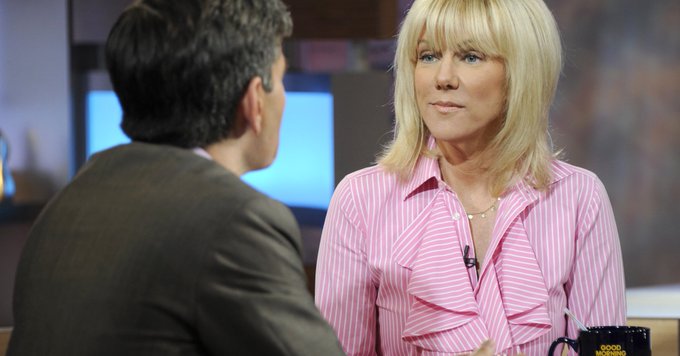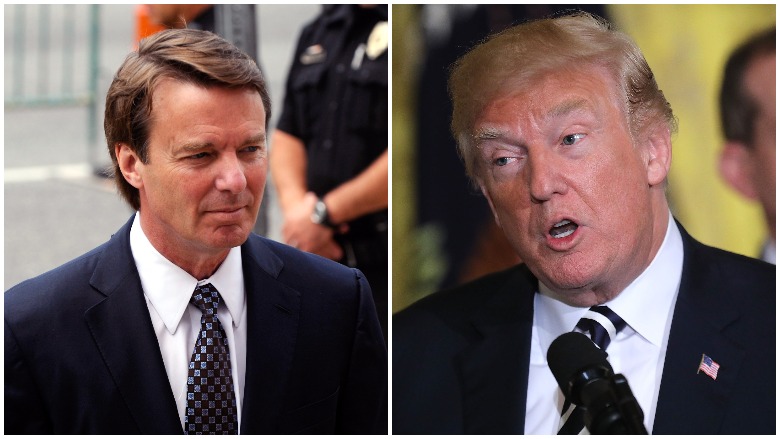
Before Stormy Daniels and Donald Trump, there was John Edwards and Rielle Hunter. Although there are differences between the two situations – for one, Trump denies having sex with Daniels – reviewing the campaign finance charge (and ultimate acquittal) of Edwards may be instrumental in trying to understand what Rudy Giuliani and Trump were trying to accomplish with comments on the payment.
Giuliani, now an attorney for the president, revealed that Trump repaid, in several installments, his lawyer Michael Cohen for a $130,000 payment to Daniels, the porn star who accused Trump of having sex with her 12 years before.
That revelation – followed by tweets confirming the repayment from the president himself – caused a lot of pundits to accuse Giuliani of misspeaking, but it may very well be that Giuliani was speaking to prosecutors through the media and that the Trump team is trying to ward off a potential campaign finance violation charge (setting aside the question of whether a sitting president can be indicted while in office, which is a contested point.)
What would the campaign finance vulnerability be for such a payment? Edwards was charged with felonies and was acquitted on one count and the jury deadlocked on others, but he was not retried. The charges were for “conspiracy, accepting illegal campaign contributions and making false statements,” Politico reported.
As with Trump and Cohen/Daniels, the controversy involved payments to Hunter that were made through a middleman.
Here’s a comparison:
1. Edwards Was Accused of a Felony for Payments Made to His Mistress During a Presidential Campaign
John Edwards was “accused of soliciting nearly $1 million from two wealthy donors from 2007 to 2008 and using that money to cover up his affair with Rielle Hunter while running for president,” according to ABC News. “Prosecutors say that they were campaign contributions because they were meant to prevent Edwards’s 2008 presidential bid from collapsing if the affair was discovered. They say the contributions also exceeded legal limits,” The Washington Post wrote of prosecutors’ arguments against Edwards (who had impregnated Rielle Hunter.)
“Prosecutors said that the payments violated the $2,300 limit on contributions from individuals and that Edwards concealed them from the Federal Election Commission,” The Post noted.”
The Trump comparison: It was Trump’s attorney – not donors – who paid off a woman during the presidential campaign who has accused him of having sex with her years before. Trump denies he had sex with Stormy Daniels. The other difference here: Giuliani is now saying that Trump paid Cohen back, although he – and Trump – later clarified that the president was paying him a general retainer for expenses and wasn’t aware it was being used specifically for Daniels.
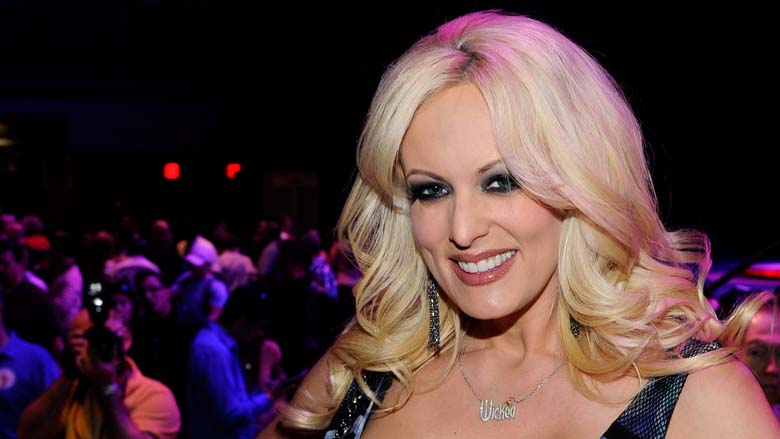
GettyStormy Daniels pictured in 2012.
“Mr. Cohen, an attorney, received a monthly retainer, not from the campaign and having nothing to do with the campaign, from which he entered into, through reimbursement, a private contract between two parties, known as a non-disclosure agreement, or NDA,” Trump wrote on Twitter.
“…very common among celebrities and people of wealth. In this case it is in full force and effect and will be used in Arbitration for damages against Ms. Clifford (Daniels). The agreement was used to stop the false and extortionist accusations made by her about an affair despite already having signed a detailed letter admitting that there was no affair. Prior to its violation by Ms. Clifford and her attorney, this was a private agreement.”
However, some argue that a Cohen loan to Trump would be a different crime.
Giuliani said on television: “That money was not campaign money. Sorry — I’m giving you a fact that you don’t know. It’s not campaign money — no campaign finance violation.”
The key here is that a candidate can give unlimited amounts of money to his campaign, but an outside party must abide by campaign finance limits. But when does it become a campaign finance matter at all?
2. Edwards’ Lawyers Argued That the Payment Was a Personal Matter
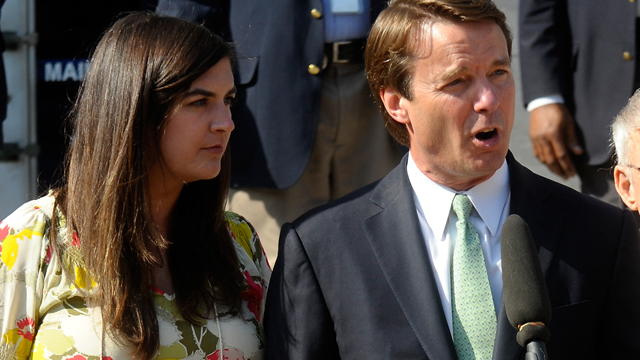
Edwards pictured with his eldest daughter, Cate.
Although it all unfolded in the height of a presidential campaign, Edwards’ lawyers argued (successfully) that the payments were motivated by his desire to protect his breast cancer-stricken wife, Elizabeth, from learning about Rielle Hunter’s pregnancy. If the money exchanged hands as purely a personal matter, then it’s not subject to campaign finance rules.
“The funds, spent on private jet travel, luxury hotels and housing for Edwards’s mistress, Rielle Hunter, never passed through campaign accounts,” noted Politico at the time.
Trump made a similar argument on Twitter, casting the payment as a private matter, although not mentioning Melania. “Money from the campaign, or campaign contributions, played no (role) in this transaction,” the president wrote on Twitter. However, Giuliani did bring up the president’s marriage, saying, “It wasn’t for the campaign — it was to save their marriage — not so much their marriage so much as their reputation.”
The tricky part in the Edwards case and Trump situation when it comes to that angle: Both men were running for president. Trump – and Giuliani – have taken great paints to suggest that the Daniels payoff was also a personal matter. Kellyanne Conway’s husband, George Conway, a lawyer, tweeted this out:
Remember it worked for Edwards, who ran for president as a Democrat: He was acquitted on the campaign finance charge and not retried.
In Trump’s circumstance, though, the “it was personal” argument would be complicated by the fact that the payment to Daniels was made less than two weeks before the election and with debate swirling in the news media about Trump and women. Furthermore, Giuliani made other comments on television that Trump wanted the Daniels controversy to “go away.”
However, Bradley Smith, former FEC chairman, told CNN he doesn’t think the Trump matter would constitute a campaign finance violation because “the standard is: It’s a campaign expenditure if it is an obligation that would not exist were it not for the campaign.”
3. Cohen & Young: Alleged Middlemen
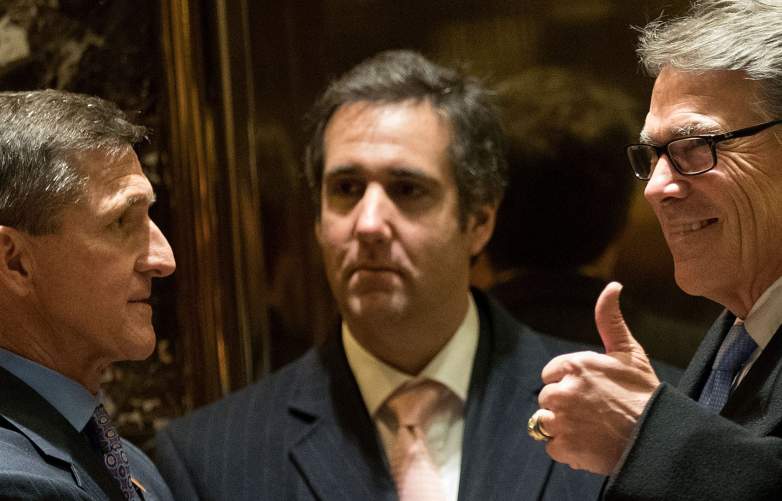
GettyMichael Cohen
In the case of Edwards, experts said a prosecutorial hurdle was to prove criminal intent. The two donors were not in a position to be of much use in that. “One of them is dead, and the other is 100 years old,” a Democratic campaign finance expert told The Washington Post at the time that Edwards was charged.
However, in the Trump situation, Cohen is very much alive, and he’s facing legal peril himself, as his office was raided by the FBI. One argument is that Trump, by saying he repaid Cohen, is trying to lessen the legal liability against the lawyer so he has less incentive to flip.
Prosecutors in the Edwards case, though, did accuse an Edwards’ aide Andrew Young of essentially being the middleman between the donors and Edwards. Of course, again, in the Trump situation, Giuliani is now saying that the money came from Trump himself in the form of repayment to Cohen, whereas there was no allegation that Edwards repaid the donors for the money used to help Rielle Hunter.
Edwards’ defense attorneys tried to paint Young, not Edwards, as the “mastermind,” ABC News reported.
Some experts say Giuliani’s comments put Trump in more legal jeopardy because it makes it easier for prosecutors to show he had knowledge of the payment. Paul Ryan, of Common Cause, told The New York Times, the admission “could allow prosecutors to make the case that Mr. Trump ‘knowingly caused his campaign committee to file an incomplete disclosure report with the F.E.C.’” Of course, Trump and Giuliani have tried to thread this needle by stating the repayment was a general retainer fee, rendering Trump unaware of the specifics.
Analyst Jeffrey Toobin told CNN that a campaign finance charge in the Trump matter “depends on the level of intent. Most FEC, Federal Election Commission, violations are handled civilly. But if it’s willful, if it’s intentional, it can be handled criminally.”
Daniels’ lawyer Michael Avenatti told CNN there could be a criminal violation if Cohen and Trump structured the payoff “in a way to avoid detection or in an effort to make it appear to be something that it was not, namely, a retainer payment as opposed to $130,000 reimbursement, that may involve money laundering depending on how it was handled.”
4. The Acquittal & the Presidency

GettyU.S. President Donald Trump reacts after delivering his first address in 2017.
Edwards’ acquittal on the campaign finance charge was a big blow to prosecutors. It “appears to set a high bar for what constitutes illegal behavior in the realm of campaign funding,” The Christian Science Monitor wrote at the time.
Mounting such a case against Trump would also bring up an entirely different issue: Whether a sitting president can be indicted/charged in office. Edwards was a failed presidential candidate when the charge was brought. Trump is in the White House, and expert opinions on that legal question differ.
The 2010 Citizens United case by the U.S. Supreme Court was also cited in the CSM piece, with analyst Toobin quoted in CSM as saying, “The fact is, we’re going to see many fewer cases brought of this kind, largely because the Supreme Court has said we want more deregulation in this area, more freedom from government regulations.”
Trump previously said he wasn’t aware of the payment to Daniels, and Cohen previously said he wasn’t paid back by the Trump campaign or Trump organization.
